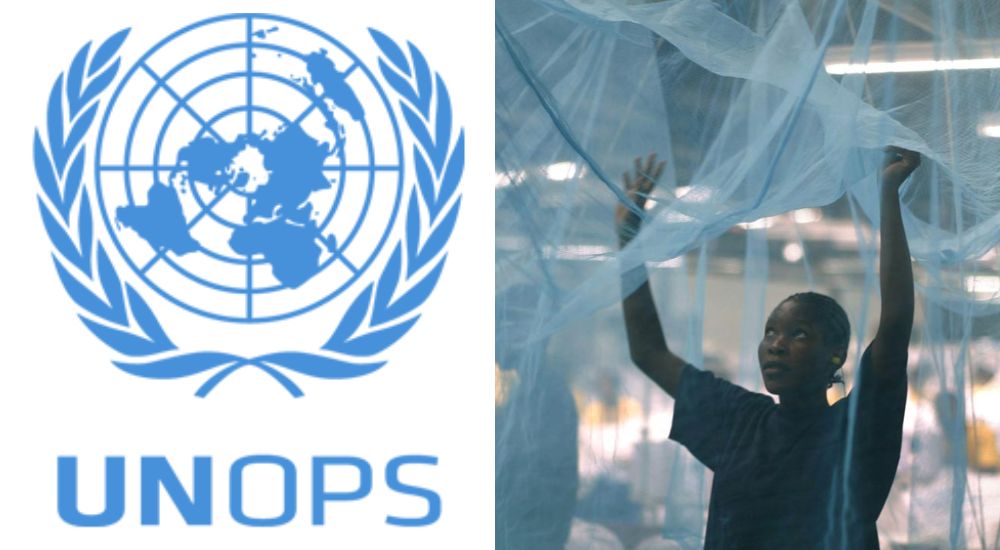EXCLUSIVE: How UNOPS Is Scuttling Nigeria’s N90bn Malaria Project
…Domestic Manufacturers Kick Against Foreign Supplies Of Mosquito Nets
A project designed to eliminate Malaria and encourage local production and capacity in the health sector is at risk of achieving the opposite as the project consultant, United Nations Office for Project Services (UNOPS), is seeking to override the Federal Government by going for foreign healthcare suppliers.
Advertisement
On September 5, 2022, Nigeria signed an agreement with UNOPS to commence acquisition of long-lasting insecticide nets for distribution in four states (Bayelsa, Edo, Enugu and Kogi, and the Federal Capital Territory) towards eliminating the scourge of malaria.
The project is called Immunisation Plus and Malaria Progress by Accelerating Coverage and Transforming Services (IMPACT).
The agreement provides for four years to execute the IMPACT project with the First Tranche of $30 million already paid to UNOPS in September 2022.
Despite the MoU and the extant laws on local content, THE WHISTLER can report that UNOPS is working to circumvent the process as it is now planning to import mosquito nets into the country, according to documents obtained by THE WHISTLER.
Advertisement
The Malaria Project
Nigeria is identified by the World Health Organisation (WHO) as one of the countries with the highest burden of Malaria, accounting for nearly 27 per cent of global malaria burden in the 2022 report by the WHO Global Malaria Programme and the Communicable and Non-Communicable diseases cluster of the WHO African region.
The four states selected for IMPACT are among the worst hit. The Federal Government identified the states and the FCT to kickstart the pilot phase in its drive for elimination of mosquito-related deaths.
In the September 2022 agreement with UNOPS, the government identified the prevalence of mosquito-related deaths, specifically spelt out UNOPS’ mandate which is to provide “advisory, implementation and transactional support services in sustainable project management, infrastructure and procurement.”
By the agreement, UNOPS’ only role is to identify local manufacturers and or suppliers, if local manufacturers are unavailable, the agency is not in any way contracted to carry out international tender to recruit international suppliers, who would import the healthcare products.
Advertisement
The government said it had confidence in UNOPS defining the UN agent as “a central resource for the UN system in procurement, contracts management and other capacity development activities, as well as its value in providing efficient, cost-effective services to partner in its specialised areas.”
Stakeholders Assessment And Recommendation Of Local Manufacturers
Unfortunately, the confidence the government had in the UN agency is not being met following what insiders describe as underhand practices to enlist the services of foreign suppliers to import mosquito nets against the recommendation by the Federal Ministry of Health, National Malaria Elimination Programme (NMEP) and the World Bank and Procurement Consultant, IMPACT.
Other members of a strong assessment team that went round the country to certify local manufacturers with capacity to manufacture mosquito nets locally were Head, Integrated Vector Management, NMEP; procurement officer, IMPACT-NMEP; representatives of the Office of the Minister of Health; Minister of State for Health; Permanent Secretary, Ministry of Health and the Deputy Director in the ministry, documents show.
It also goes against the 9th National Assembly advisory which sanctioned the Federal Government request to acquire the loan from the International Development Association (IDA), but directed strict adherence to the provision of the Executive Order (EO 003) which prioritised the patronage of local content in the implementation of the project.
UNOPS had initially sourced out adequate local manufacturers that could deliver on the project in accelerated fashion.
Advertisement
Also, the Federal Ministry of Industry, Trade and Investment in another positive outlook on available local manufacturers wrote the health ministry about available local manufacturers of Long-Lasting Insecticide Net (LLIN).
This informed the composition of the team that went round the country to visit production sites of the LLIN manufacturers for assessment and verification of their production capacities.
The team visited Lagos between 10 and 14 October, 2022 and Aba, Abia State between 18 and 20 of October, 2022, according to documents about the visitations.
In the report of the assessment obtained by THE WHISTLER, the team recommended only one of the five companies it assessed to be awarded the project.
It said Rosies Textiles Mills, Aba, Abia State, “having the required experience and capacity to manufacture and finish/package LLIN locally with the history of timely execution of the large quantities of LLIN in the past, and having been found to possess the capacity for manufacturing 165,000 nets per day with the potential to scale-up should be considered for local patronage pursuant to Executive Order (EO 003).”
The team further highlighted that, “Since Rosies Textile Mills Limited is the only identified local WHO approved and NAFDAC registered LLIN manufacturer, other local suppliers can get manufacturer’s authorisation from the company to enable them qualify for the participation in the exercise for the procurement of LLIN in Nigeria.”
UNOPS was properly informed of the stakeholders’ assessment with a clear mandate to use local manufacturers but it ignored the directive.
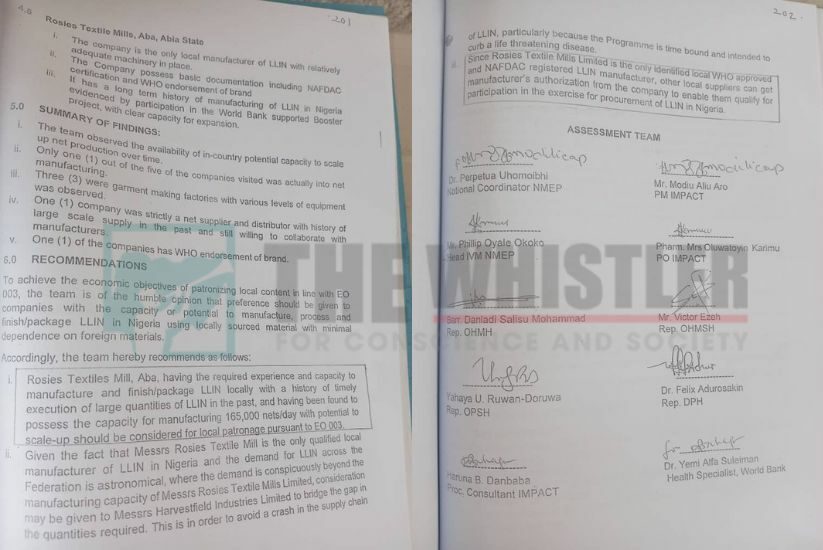
UNOPS Opens First Bidding Process
Following the MOU that provided that the bidding process must be competitive, UNOPS opened the first bidding on Thursday, June 2, 2022 calling for “expression of interest for the supply of locally manufactured long-lasting insecticide mosquito nets” as directed by the Federal Government that the nets must be sourced locally.
To be qualified, the UN agent said “the nets are expected to be produced and packaged in Nigeria and must have both NAFDAC and WHO certification to deliver the project within 12 months.”
UNOPS in its publications sighted by our Correspondent promised to conclude the procurement process by 6th December 2022 and delivery of the LLINS to start by August 7, 2023 for the 5 States.
UNOPS Unilateral Cancellation Of Bidding, Announced Fresh Bidding
Things took a dramatic turn when UNOPS ignored the mandate it received from the health ministry and cancelled the bidding process without informing the federal government as stipulated in the agreement it entered with the Nigerian government.
Instead, it announced via a publication of Monday February 6, 2023 that vendors should visit its website to bid for the LLIN project which it said was posted on February 3, with the bidding process expected to end February 20th, 2023.
Prior to this, it wrote Rosies Textile Mills Limited explaining why it cancelled the tender saying, “there’s the need to change and revise the technical requirements.
“We intend to relaunch this procurement very soon through international competitive bidding so you are encouraged to kindly monitor the UNGM for the new tender.” This clearly violates the scope and mandate of the MOU.
A source in the health ministry angry with the development explained that the fresh tender was to enlist international manufacturers in clear disregard for EO 003, MOU with the Federal Government, National Assembly resolution on the LLIN project while approving the loan and the directive from the health ministry.
“It was supposed to be a local bidding process but UNOPS being who they are, knew why they were delaying to secretly enlist the services of international manufacturers to import the nets.
“It’s a slap on the face of the country,” a source in the health ministry said, adding, “who obtains a loan to fund foreign companies when the country has manufacturers for the project?”
“Conduct a check in UNOPS and you will be amazed at the reports of corruption against them globally,” said the official at the health ministry who also alleged that some highly placed ministry officials were conniving with the UN agency.
UNOPS Global Image, Corruption Allegation And Legal Battles
The group has long been known and accused of corruption in a number of countries and is facing legal battles in several countries.
In 2022, Finland cancelled its funding worth €20 million with UNOPS which would have enabled it to open an office in Helsinki following a barrage of reported corruption allegations in several countries.
Earlier, it was put under internal investigation for the disappearance of $60 million from its office with a number of its executives, including Vitaly Vandhelboim, fired.
The organisation, suffering from a battered image due to allegations of corruption, gets less attention from the governments of other countries. But in Nigeria, the UN entity operates freely and sometimes in alleged disregard for local laws and directives.
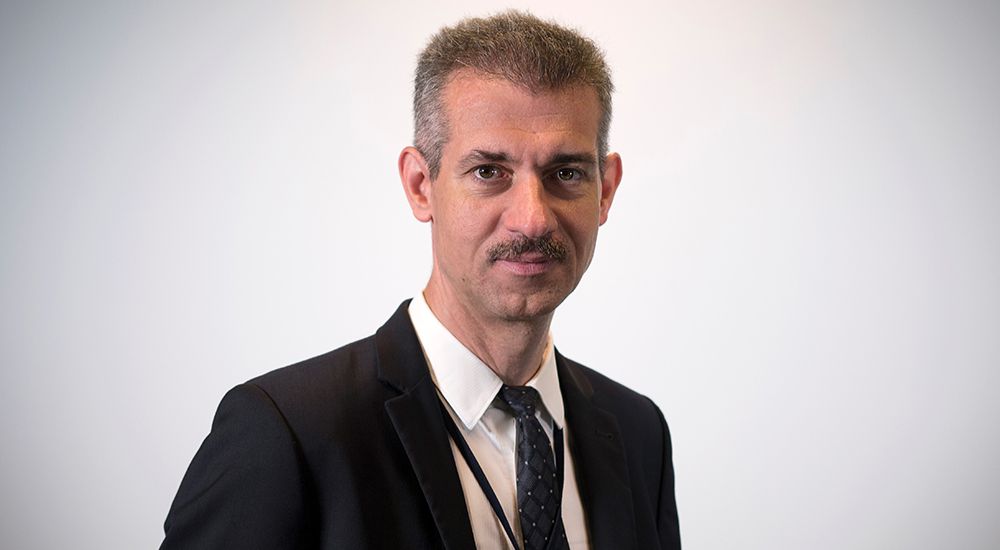
Federal Government Warned UNOPS, Demands Conclusion Of Tender Using MOU
In a letter personally signed by the immediate past Minister of Health, Dr Osagie Ehanire and obtained by THE WHISTLER, the Minister frowned at the delay and the scheming by UNOPS to arrogate to itself, mandate beyond the scope of the MOU, and ordered the conclusion of the tendering process immediately.
In the letter dated May 24, 2023, the Minister wrote UNOPS, drawing its attention to the MOU, ordering that “in compliance with Executive Order 003, your office is expected to honour the directive on local content, while by the provision of the MOU, the process for the procurement of LLIN, one of the products manufactured in Nigeria, should have been concluded by December 6, 2022.
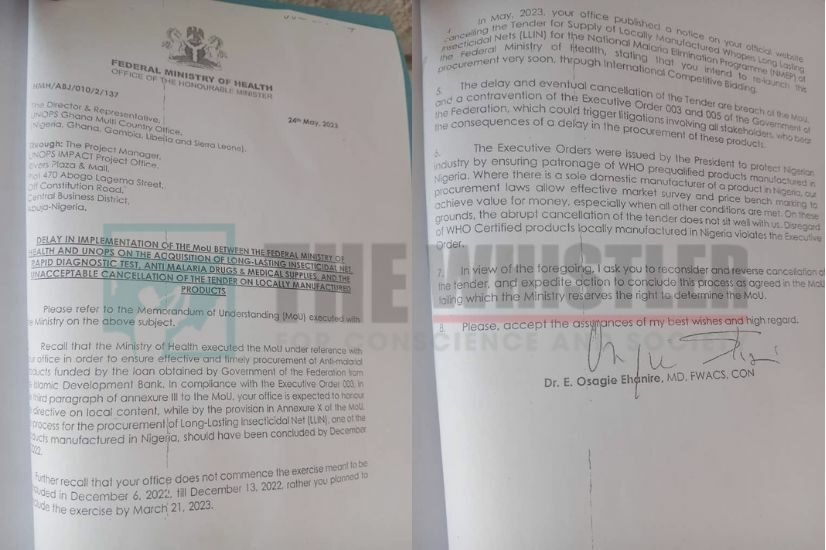
While drawing UNOPS’ attention to the delay in commencement of the tender till December 13, 2022 instead of concluding it by December 6, 2023, and its plan to conclude the exercise by March 21, 2023 through international competitive bidding, the minister said the agency was “in breach of the MOU, and contravention of the Executive Order 003 and 005 of the government, which could trigger litigation involving all stakeholders, who bear the consequences of a delay in the procurement of these products.”
The minister explicitly reminded UNOPS that “the Executive Orders were issued by the President to protect Nigerian industry by ensuring patronage of WHO prequalified products manufactured in Nigeria. Where there is a sole domestic manufacturer of a product in Nigeria, our procurement laws allow effective market survey and price bench marking to achieve value for money, especially when all other conditions are met.
“On these grounds, the abrupt cancellation of the tender does not sit well with us.
“Disregard of WHO certified products locally manufactured in Nigeria violates the Executive Order.”
The minister advised that based on the above , “I ask you to reconsider and reverse cancellation of the tender, and expedite action to conclude this process as agreed in the MOU, failing which the ministry reserves the right to determine the MOU.”
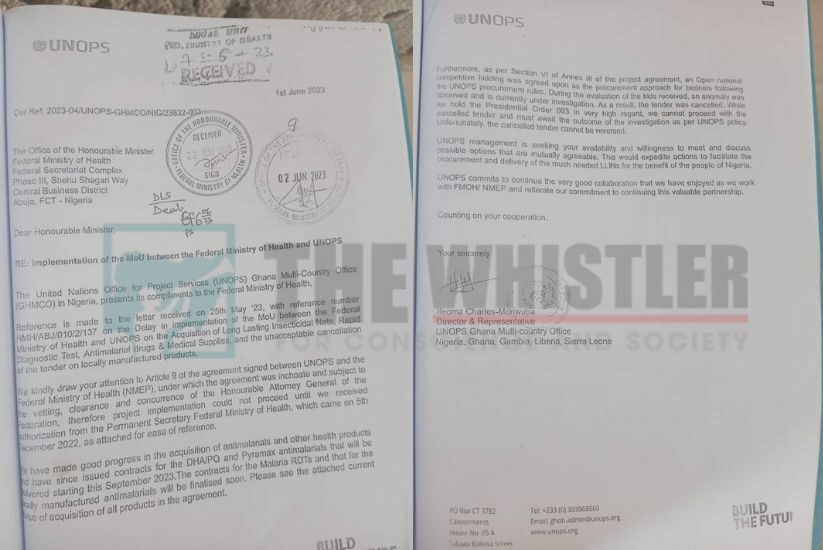
Blacklisting Nigerian Manufacturers And Suppliers For Patronage Of Foreign Ones
In order to ensure the foreign companies it selected undertake the supplies of the LLIN, UNOPS went against Nigerian companies, record of correspondence on accusations against the companies show.
In what is seen by stakeholders as targeted blackmail, UNOPS specifically queried Rosies Textile Mills Ltd, the only certified manufacturers of the LLIN for allegedly colluding with other vendors.
In a query issued by its subregional headquarters in Ghana, UNOPS accused Rosies Textile Mills of colluding with Danyakubu Global Services Ltd and Resizar International Co. Ltd noting that “Rosies submitted a bid and offered to supply nets to the two other bidders as a subcontractor without disclosing this information to UNOPS.”
In the documents obtained by our correspondent, Rosies Textile Mills Ltd argued that as per the MOU with the Nigerian government, it issued manufacturer’s authorisation to local suppliers prior to the commencement of the project.
The company said it is true that it gave Danyakubu Global Services Ltd and Resizar International Co. Ltd manufacturer’s authorisation, referring to the agreement entered between the FG and UNOPS which stated that, “The project agreement between UNOPS and the FG” provided for “local suppliers who have manufacturer’s authorisation from local manufacturers that can take part in the tender.”
The guidelines UNOPS provided during the local bidding process said “both local manufacturers who have WHO and NAFDAC certification and local suppliers who have manufacturer’s authorisation of distributorship of WHO approved LLINs from local manufacturers” are allowed to bid.
Rosies Textile Mills Ltd in the documents accused UNOPs of “instigating non-existent allegation of collusion in order to blacklist it and bring in foreign companies to supply the same products manufactured in Nigeria.”
It noted further that, “If not, why would the process of querying it be ongoing while UNOPS decided to float an international tender calling for international bidders if not that it has selected foreign suppliers to supply LLINs, which is even against FG’s directives as contained in the MOU, EO 003, 005 and the National Assembly guidelines before granting the loan.”
Manufacturers Fight Back
In the documents sighted by our Correspondent, the manufacturers have written to the National Assembly, the health ministry and others accusing UNOPS of flagrant disregard of extant laws, MOU and executive orders.
Specifically, in one of the petitions, Rosies Textile Mills Ltd lamented that “The money given to UNOPS has stayed for one year and no single tablets or net has been procured. It has also exceeded the agreed timeline.
“On many forums UNOPS keeps on giving flimsy excuses such as ‘no capacity, anomaly, change of technical specifications now whistleblowing etc this has delayed the agreement timeline.
“UNOPS has opted to lobby at a higher level to circumvent the signed MOU, they may also use the forthcoming UNGA meeting in New York this month to achieve their aim.”
It therefore argued that, “UNOPS is a contractor that Nigeria is paying over $2m to carry out the task and is not ready to procure locally manufactured LLINs. They prefer to delay and have the money earning interest in their account.
“They have even moved the status of the ICB publication on the UNGM platform to evaluation in disregard of the health ministry directive to suspend all activities
“All the flimsy excuses and unilateral steps taken by UNOPS to cancel the Tender have been against the MOU. UNOPS only have the power to promptly report to the Ministry and Bank who will then take the decision but till date no report of any fraud or collusion etc from UNOPS but only contradictory verbal statements.”
it recommended that UNOPS should “revert to the original MOU and complete the evaluation and award of the 1st Tender for the LLINS procurement within 2 weeks.”
Textiles Stakeholders React, Blame Health Ministry
Stakeholders in the textile industry have reacted to the development blaming the health ministry.
According to Hamma Ali Kwajaffa, President Textiles Manufacturers Association of Nigeria, “the ministry of health is to blame. It’s the problem of the ministry for failing to carry stakeholders along.”
He told THE WHISTLER that, “Actions of ministries embolden these foreign agents and companies to act in a way that destroys local manufacturers. This should not be allowed to stand.
“Manufacturers are shutting down and UNOPS cannot be allowed to do this. Our association will step in and act,” he said.
UNOPS Can Only Speak Via Mail
UNOPS project Director for IMPACT, Omolola Opago Charles, refused to respond to the allegations when THE WHISTLER contacted the organization via telephone.
When told of IMPACT, she said, “Send an email and you will get a response,” and hung up the phone. Several calls were made to the telephone line again without response.
Our Correspondent subsequently forwarded an email requesting a response to the allegations to: [email protected], but there was no reply. Text messages sent were also neither acknowledged nor replied.


